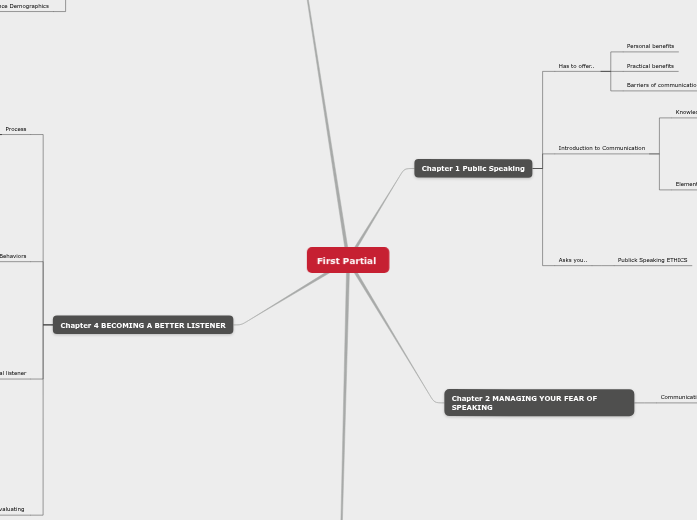First Partial
Chapter 1 Public Speaking
Has to offer..
Personal benefits
Practical benefits
Barriers of communication
Introduction to Communication
Knowledge of communication: SPEECH
Elements of public speaking
Speaker
Message
Occasion
Audience
Interference
Feedback
Asks you..
Publick Speaking ETHICS
Chapter 2 MANAGING YOUR FEAR OF SPEAKING
Communication Anxiety
Managing it
Visualization
Selective relazation
Attitude adjustment
Cognitive restructring
10 ways to control communication anxiety
Chapter 5: ADAPTING YOUR AUDIENCE AND SITUATION
Challenges for diversity
Stereotypes
Ethnocentrism
Sexism
Gender stereotyping
Symbolic racism
Universal Values
Power
Achievement
Enjoyment
Unity
Communications Skills
Place
Occasion
Time
Size of audience
Context
Audience Dynamics
Beliefs
Motivation
Appeals
Belonging
Tradition
Safety
Comfort
Independence
Attitudes
Values
Audience Demographics
Chapter 4 BECOMING A BETTER LISTENER
Process
Threshold : pickup cues, body language
Empathic: listen with the heart
Constructive: search value
Critical: evaluates the message
Behaviors
Internal Barriers
Inattention
Bad listening habits
Emotional reactions
Personal biasis
External Barriers
Physical noise
Flawed messages
Presentation problems
Critical listener
Claims and proposals justified
RELEVANT
RECENT
RELIABLE
REPRESENTATIVE
Evaluating
Adaptation
Commitment
Purpose
Freshness
Ethics
Substance
Ppresentation skills
Structure
Introduction
Body
Conclusion
Chapter 3 YOUR FIRST SPEECH
Managing impressions
ETHOS
Competence
Dynamism
Goodwill
Integrity
PREPARING IT
#1 : Find topic
#2 : Focus your topic
#3 : Find material
#4 : Design
#5 : Outline
#6 : Practice
#7 : GIVE IT
